
Apiculture programs and resources from Michigan State University Extension
February 21, 2025 - Ana Heck, Michigan State University Extension, and Meghan Milbrath, Michigan State University, Department of Entomology
The MSU Extension’s apiculture team provides information and resources for beekeepers to improve honey bee management and health. This article provides a brief overview of MSU Extension's work to support beekeepers and pollinator enthusiasts.
Supporting Michigan beekeepers
Is Beekeeping Right for Me? online course
![]()
The Is Beekeeping Right for Me? online course provides an introduction to honey bees, covers the time required, physical demands and financial resources of beekeeping and suggests ways to help all pollinators. The course includes what many beekeepers report they wished they had known when getting started.
Online Articles
People who choose to begin keeping bees can find resources at getting started with beekeeping in Michigan. Online articles and other beekeeping resources are listed on the MSU Extension beekeeping website. These articles cover a range of topics, including Diagnostic labs and services for beekeepers, Varroa mite treatments not included in the 8th Edition of the Honey Bee Health Coalition's Tools for Varroa Management guide, and what to do if you suspect your honey bee colonies are harmed by pesticides.
Beekeeping webinars
MSU hosts a series of office hours webinars during the beekeeping season. Each month from March through September, the team discusses seasonal beekeeping topics and answers questions.
Visit the MSU Extension page of beekeeping & pollinators videos and the MSU Beekeeping’s YouTube channel to see past webinars and, sign up for the MSU Extension Beekeeping & Pollinators email newsletter to find out about future webinars.
Invited presentations on beekeeping and pollinators
The MSU Extension apiculture team gives in-person, in-hive and virtual presentations to beekeepers, growers, pesticide applicators, home gardeners and other members of the public. To request a presentation for a bee club or group, please contact Ana Heck, Meghan Milbrath or Zachary Huang.
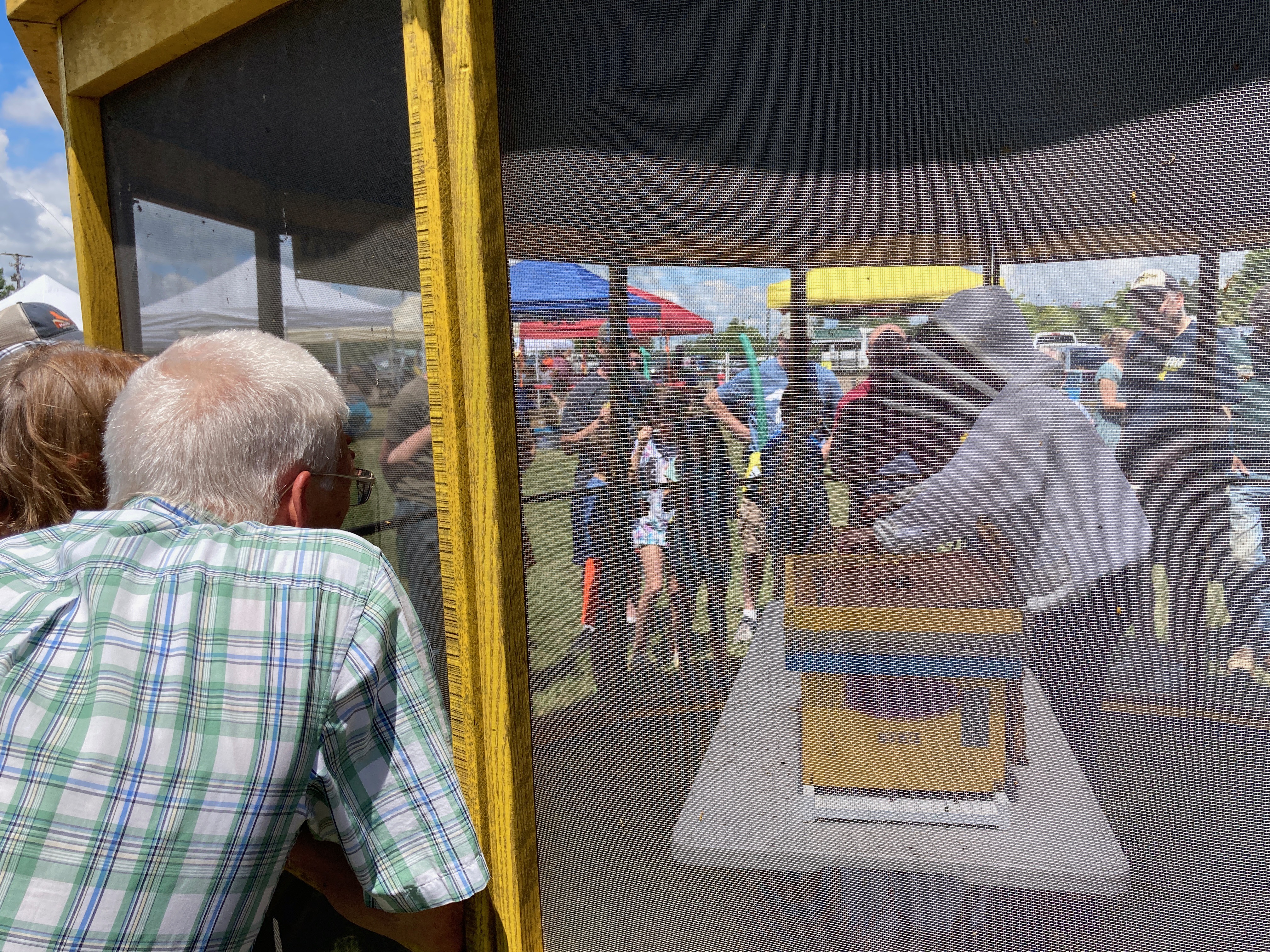
Michigan Beekeepers Association Conferences
Every year, MSU Extension collaborates with the Michigan Beekeepers Association to host and plan its spring and fall conferences. These conferences are attended by hundreds of beekeepers statewide, and they include speakers on a variety of topics ranging from bee health to using hive products. Beekeepers can receive information about upcoming conferences by signing up for the Michigan Beekeepers Association’s newsletter.
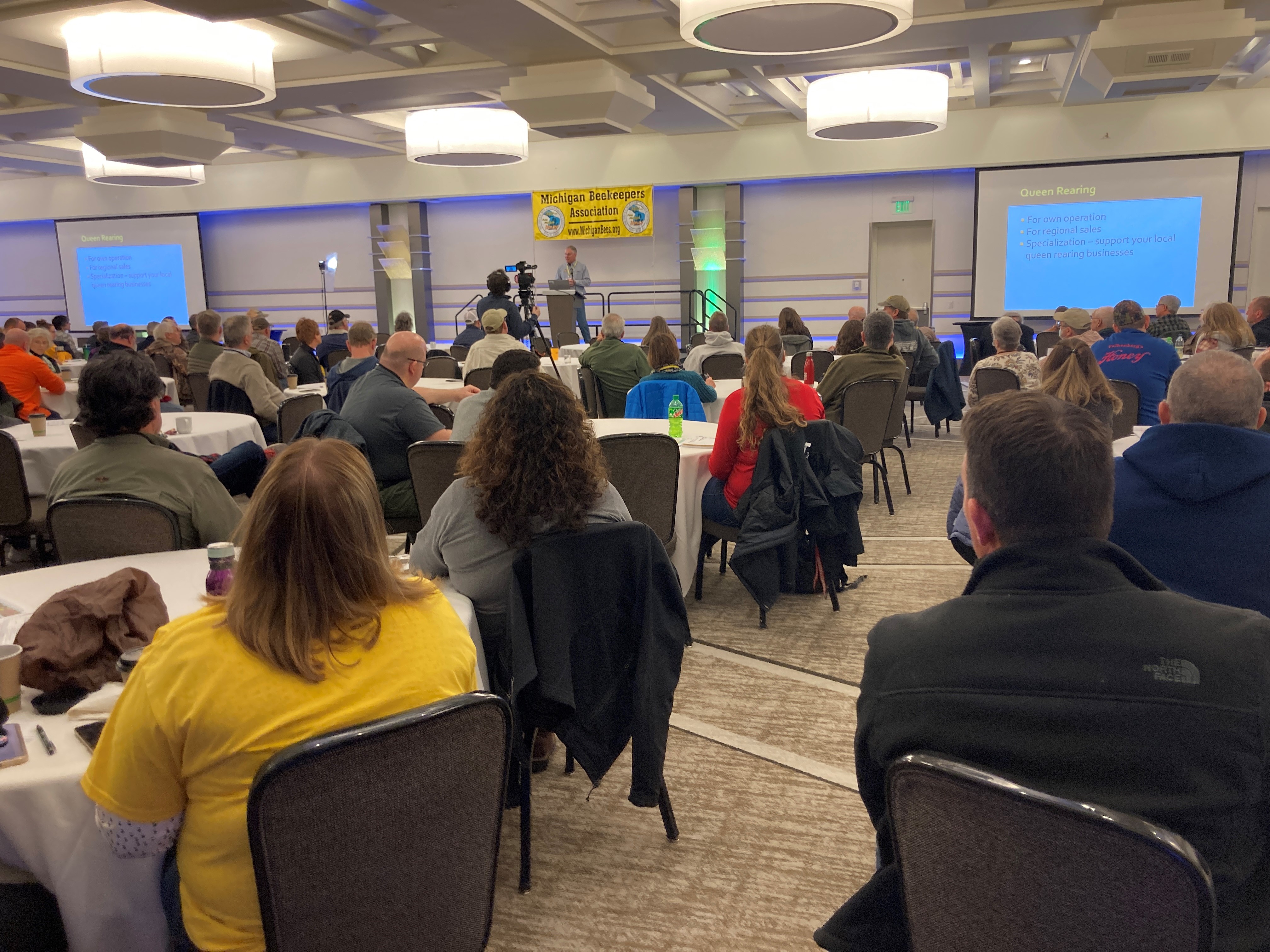
Farm business resources for beekeepers
MSU Extension Farm Management has many resources that can benefit beekeepers who run their operations as a business. Resources specific to beekeeping include the Turning your beekeeping hobby into a business's webinar recording and an online article on how the Micro Farm Program, a USDA crop insurance program, can benefit beekeepers.
Michigan rules and regulations for beekeeping
MSU helps beekeepers demystify beekeeping related rules, regulations and guidelines in the state in the document “Starting and Keeping Bees in Michigan: Rules and Regulations.” Beekeepers will find information related to beekeeping and the Michigan Right to Farm Act and Generally Accepted Agricultural and Management Practices (GAAMPs), organic beekeeping, transporting hives to and from Michigan, honey processing, rules and regulations for selling honey in Michigan and more!
Additional resources on beekeeping rules and regulations include:
- Rules and regulations for selling honey in Michigan
- Producing a Value-Added Product on the Farm: Liquid Honey
- Generally accepted agricultural and management practices for honey bees
- What to do if you suspect your honey bee colonies are harmed by pesticides
- When do beekeepers in Michigan need pesticide certification and licenses?
- EPA issues advisory for substances used to control varroa mites in beehives
Honey Bee Health Coalition Steering Committee
MSU Extension is a member of the Honey Bee Health Coalition's steering committee. Members collaborate to develop resources and initiatives to improve honey bee health. The Honey Bee Health Coalition’s Bee Integrated Demonstration Project featured Michigan beekeepers and growers in videos highlighting good communication to support pollination and pollinator health.
Supporting professionals who work with beekeepers and honey bees
Training veterinary practitioners in honey bee health
MSU has the longest running and most robust honey bee medicine training program for veterinary students in the country. It is important that veterinarians are familiar with honey bees and their diseases, since federal legislation requires that beekeepers work with veterinarians to acquire medicine for sick honey bee colonies. Since 2018, MSU College of Veterinary Medicine has held an annual three-week rotation for fourth year veterinary students and a veterinary student bee club for second and third year students to provide future veterinarians training on how to provide care to bees and support for beekeepers.
MSU leads a collaborative effort between University of Florida, University of Minnesota and Texas A&M University to deliver hands-on clinics on honey bee handling, health and care for practicing and retired veterinarians, veterinary technicians and veterinary students. The collaboration also develops robust training and diagnostic resources for veterinary practitioners, including the Diagnostic Tools for Honey Bee Diseases online learning module.
The MSU apiculture team regularly presents to and hosts hands-on workshops for the MSU College of Veterinary Medicine's honey bee medicine student club. Milbrath is the faculty advisor to the student club.
Milbrath sits on the education committee of the national Honey Bee Veterinary Consortium, and MSU hosted its virtual and in-person conference of veterinarians in August 2022.
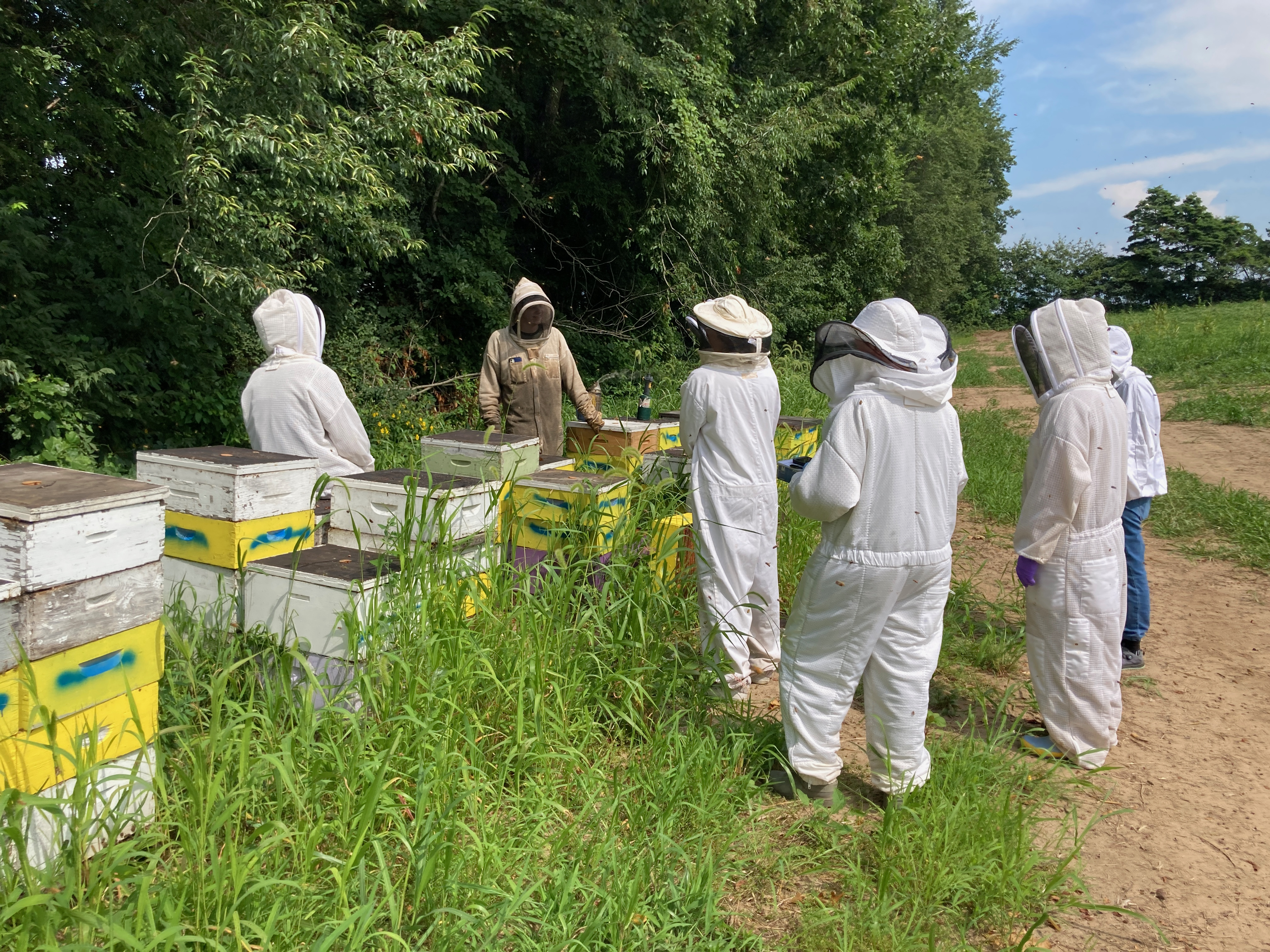
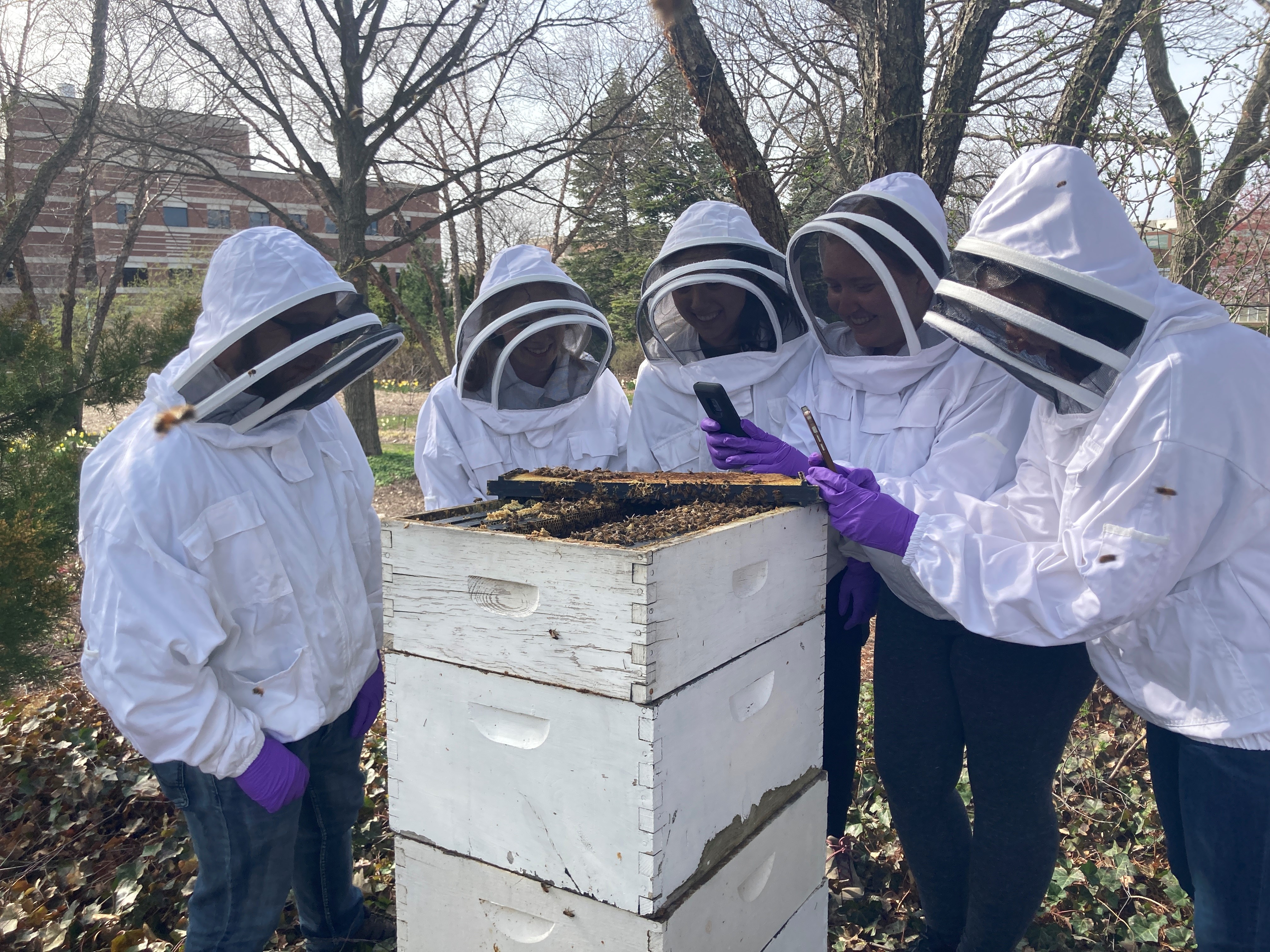
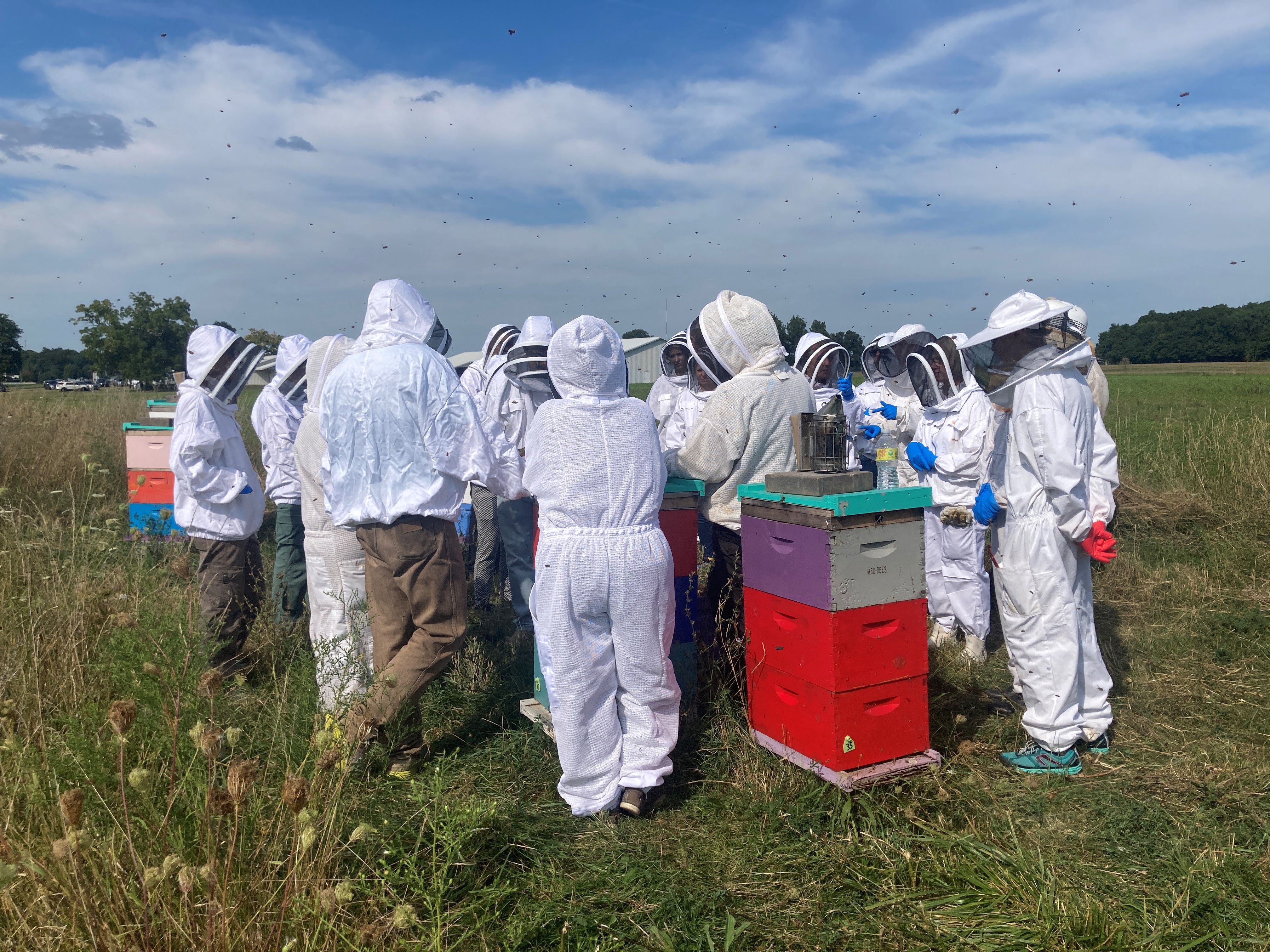
Trainings for government employees
MSU provides in-hive training to the Michigan Department of Agriculture and Rural Development (MDARD) and the United States Department of Agriculture (USDA). The MSU apiculture team works closely with government partners of the beekeeping industry, and hosts training sessions and webinars for the MDARD Animal Agriculture Division, USDA Farm Service Agency Technicians, and MDARD inspectors. These inspectors may provide certificates to migratory operations traveling outside of Michigan or investigate suspected incidences of bee kills due to pesticides.
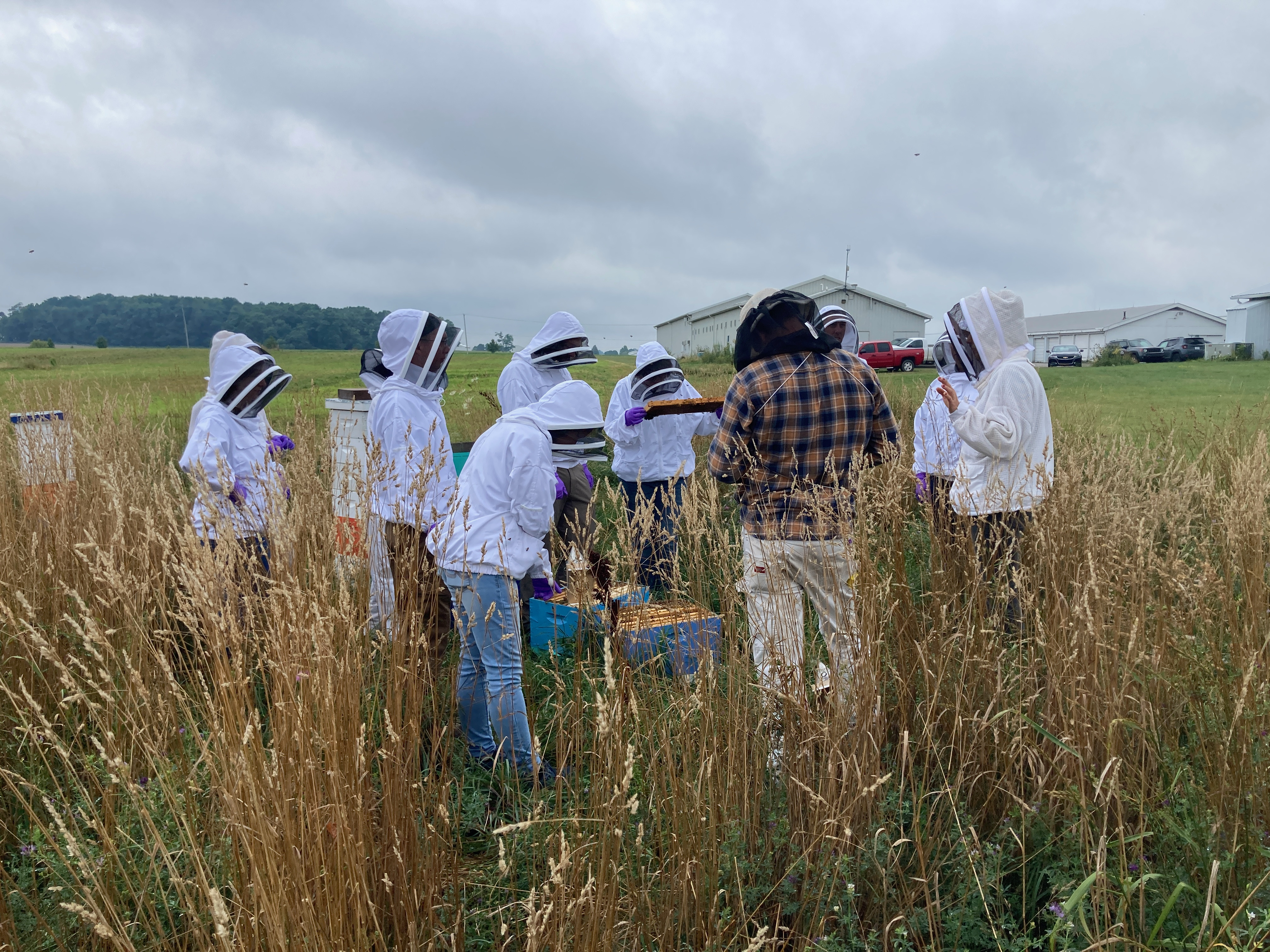
Preparing first responders for transportation accidents involving honey bees
MSU Extension’s apiculture program is part of the Emergency Response to Accidents Involving Livestock program, which trains first responders to deal with road accidents and incidents involving livestock, including honey bees. MSU provides information to first responders, animal control, and other officials who deal with accidents through in-person comprehensive training and an online article, Emergency response to accidents involving honey bees. Several Emergency Response to Accidents Involving Livestock Response Trailers stationed across Michigan also have beekeeping protective equipment for first responders to use in the case of an accident involving honey bees.
Sharing pollinator stewardship strategies with pesticide applicators and growers
Michigan Managed Pollinator Protection Plan
MSU works to advance the Michigan Managed Pollinator Protection Plan by providing pollinator stewardship and protection information to growers, pesticide applicators, home gardeners and the public. One highlight includes leading a national managed pollinator protection plans working group, which developed two online courses, Pollinator Protection for Pesticide Applicators and Pollinator Protection for Land Managers. Certified pesticide applicators can complete the course to earn a restricted use pesticide (RUP) credit.
For more information on Michigan's pollinator stewardship work, please see Managed Pollinator Protection Plan update from MSU Extension.
Great Lakes Latino/a Farmers Program
MSU's pollinator program is part of the Great Lakes Latino/a Farmers Program, which provides training for first generation farmers in Michigan. MSU's apiculture team provides information on honey bees, pollination and pollinator protection.
Supporting pollinator health through increased habitat and forage
Many people are interested in establishing pollinator habitat but don’t know where to start. The Michigan Pollinator Initiative maintains a website with planting resources and information on pollinator lawns, pollinator gardens, planting trees for pollinators and large-scale pollinator habitat, which includes a database of Michigan companies that will help install and maintain pollinator habitat, and a directory of Michigan native plant providers. Several webinar recordings on pollinators and bee forage are available on the MSU Beekeeping YouTube channel.
More information on planting for pollinators is available from Michigan Pollinator Initiative resources on pollinator plantings, the MSU Extension gardening for pollinators site and MSU Extension smart gardening for pollinators tip sheets.
Supporting pollinator education for the public
MSU Extension's article, “What should I do if I find a swarm of bees?,” is a resource for the public that provides suggestions for connecting with local beekeepers to relocate honey bee swarms. For colonies established in homes or other structures, MSU Extension's article "Contacts for removing honey bees from structures in Michigan" provides information and directs readers to Michigan Beekeepers Association's list of people willing to cut honey bee colonies out of structures.
Pollinator enthusiasts and home gardeners can take MSU’s free, self-paced Pollinator Champions online course. In this course, students learn about the pollinators in Michigan, why they are important, and what can be done to help them thrive. After completing this course, individuals can choose to become “Certified” Pollinator Champions, which provides them with access to a slide set and handouts, so they can provide pollinator education to groups in their area.
Impact reports
- Supporting Beekeepers & Protecting Pollinators - published in 2024
- Preparing First Responders for Accidents Involving Livestock - published in 2024
- Supporting Beekeepers & Protecting Pollinators - published in 2023
MSU Extension and Michigan Pollinator Initiative beekeeping & pollinator resources
- Michigan State University Extension Beekeeping & Pollinators website
- Michigan Pollinator Initiative website
- Pollinator protection programs and resources from Michigan State University Extension
- MSU Extension Beekeeping & Pollinators email newsletter
- Michigan State University Beekeeping YouTube channel
- Michigan Pollinator Initiative Facebook page
- Michigan State University Beekeeping Facebook page
- Ask Extension
More resources for beekeepers from MSU Extension
- AgrAbility
- MSU Extension Product Center
- MSU Extension Farm Management
- Managing Farm Stress
- MSU Extension Gardening for Pollinators
- Smart Gardening
Acknowledgments
Thank you to the Michigan Department of Agriculture and Rural Development for securing funding from the U.S. Environmental Protection Agency for Michigan State University to implement strategies in the Managed Pollinator Protection Plan.
This work is supported by the Crop Protection and Pest Management Program [grant no 2021-70006-35450 and 2024-70006-43569] from the USDA National Institute of Food and Agriculture.
This work was supported by the Enhancing Agricultural Opportunities for Military Veterans grant, award no. 2021-77028-35274 from the USDA National Institute of Food and Agriculture.
This work is supported by the USDA National Institute of Food and Agriculture, Crop Protection and Pest Management Program through the North Central IPM Center (2018-70006-28883 and 2022-70006-38001).
This work was supported by Beginning Farmer and Rancher Development Program grant no. 2021-70033-35833 from the USDA National Institute of Food and Agriculture.
This work is created with funding from the Veterinary Services Grant Program Education, Extension and Training competitive grants program of the USDA National Institute of Food and Agriculture (2202-04170) and the USDA National Institute of Food and Agriculture Sustainable Agriculture Research and Education (SARE) Research and Education Grant program (LNC22-468).
Any opinions, findings, conclusions, or recommendations expressed in this publication are those of the authors and do not necessarily reflect the view of the U.S. Department of Agriculture.



 Print
Print Email
Email
